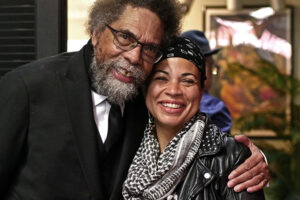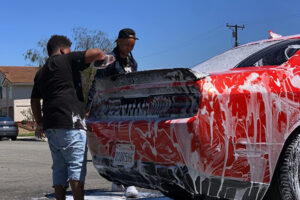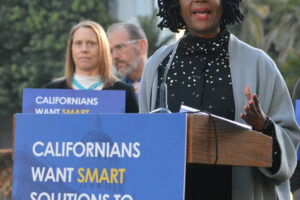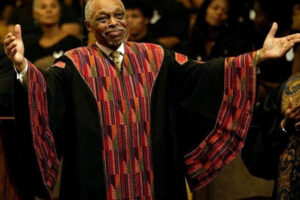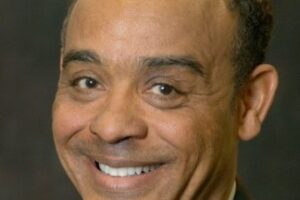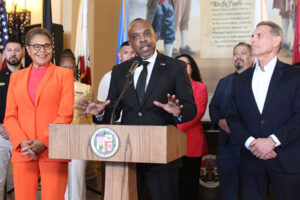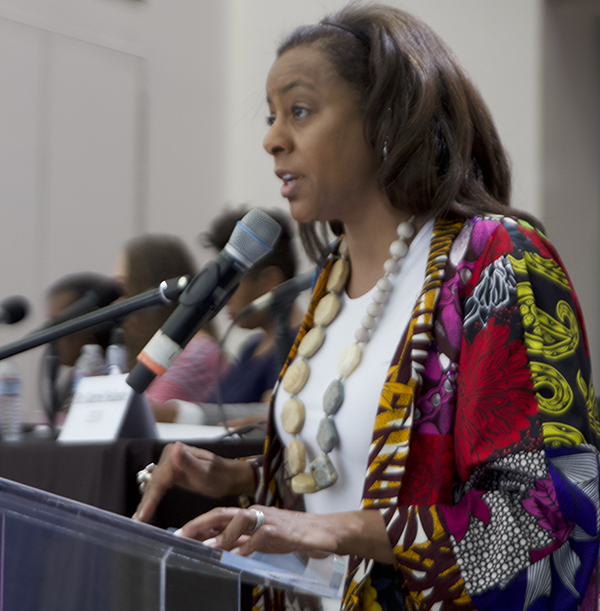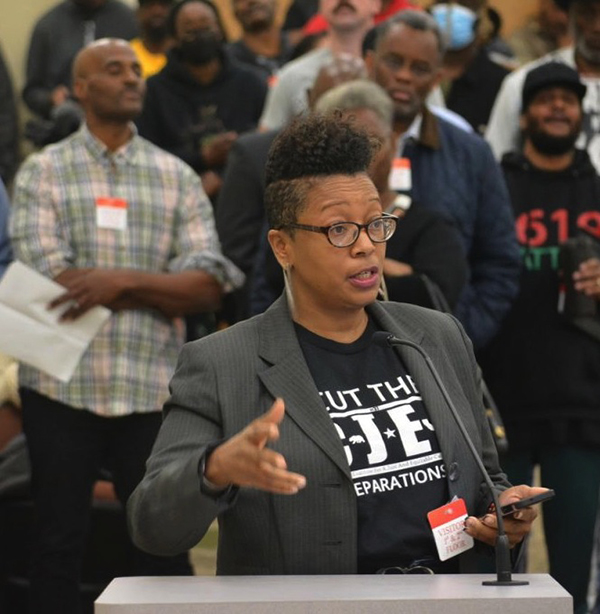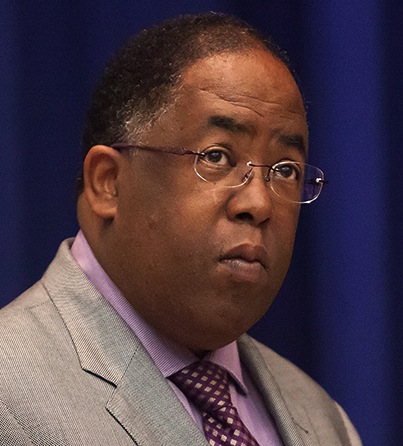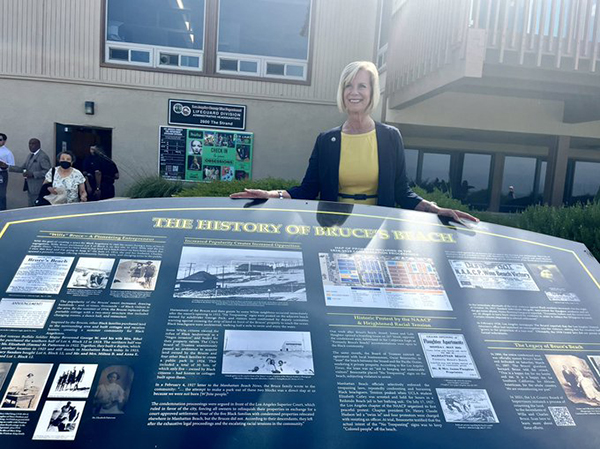By Shirley Hawkins
Contributing Writer
LOS ANGELES — The city of Los Angeles Reparations Advisory Commission held a public hearing at the California African American Museum April 22 to discuss the future goals of demanding reparations in the city.
Capri Maddox, executive director of the city’s Civil + Human Rights and Equity Department, said it was the first in-person meeting held by the commission.
The Blue-Ribbon Task Force Reparations Committee is chaired by Michael A. Lawson, president and CEO of the Los Angeles Urban League. Committee members included Lawson, Khansa Jones-Muhammad, Mark Wilson, Mandla Kayise, Katrina VanderWoude, Cheryl Harris and attorney Virgil Roberts.
Commissioners presented the city’s plans to conduct an in-depth study of harms experienced by Black Angelenos. Community members were then invited to respond with questions and public comments.
Maddox kicked off the conference by stating that one of the most egregious violations directed at African Americans was the issue of redlining, which was enforced in Los Angeles to limit housing opportunities for Blacks.
“Redlining denied Black families home ownership opportunities and generational wealth in certain zip codes, and some of those injustices continue today,” Maddox said. “African Americans and Latinos pay more than their white counterparts with the same credit scores for their mortgages today in the banking economy.
“This racist behavior has continued to show itself from housing discrimination to mass incarceration and has created a broken city of inequality,” Maddox said. “They have separated the descendants of enslaved persons from their wealth, their health and their liberty. So I want you to know that the Los Angeles Civil Rights Department was created to address some of those issues, particularly discrimination in the areas of commerce, education, employment and housing in the private sector,” Maddox said.
Referring to the death of George Floyd that rocked the nation, Maddox said, “There are so many ways that people have their knees on our necks. Until bankers, educators and people in real estate have body cameras, we still have a lot of work to do in L.A.”
Maddox added that $8.5 million dollars will soon be available and used to expand and improve communities.
“We are doing a number of programs to deal with inequities (in our communities) like our people participatory budgets program where Angelenos can decide what parts of the budget can be spent,” said Maddox, who urged participants to utilize the voting station in the museum where attendees could vote on the participatory budgeting.
“You can vote where you would like the money to go in your community,” she said. “The money is here and the time is ripe.”
Pausing, she added, “Although we are not a slave state, we know that systemic racism continues to happen right here in Los Angeles. Don’t let the palm trees fool you because there are a lot of weeds of injustice that are growing up.”
Commissioner Virgil Roberts said he was looking forward to hearing the public comments.
“We will take them into consideration and do all that we can to try to assist the city of Los Angeles and make retribution on reparations for the harm that has been caused to us for decades,” he said.
Dozens of attendees approached the microphone and expressed their views on reparations.
Dr. Jerry Abraham, the director of the Kedren Community Health Center in South Los Angeles, an acute psychiatric hospital, and a doctor at Charles Drew University of Medicine and Science, said, “In our work at Kedren and CDU we see every day the harm that has been created from the history and the past that (our) people lived. We see the disproportionate burden of mental illness, we see the lack of resources, the lack of care and of inequitable distribution of care that our community receives, especially right here in South Los Angeles.
“We know that reparations will be an important part of bringing our community forward towards healing,” Abraham added. “We cannot be healthy unless we are wealthy and wise and we must bring intergenerational wealth to communities in South Los Angeles. CDU and Kedren believe that one way to improve the health of our people is to insure that they have reparations.”
Tiara Ryder, a descendant of the Black American Freedmen, said, “I just want to remind you that in 1865, President Lincoln said that without the military help of the Black American Freedmen, the Civil War against the south would not have been won. This is a reminder that this country stands today because of the work that our ancestors did —and then the U. S. reneged on the debt that they owed us.
“Our people went to fight just to save the union — but they were also fighting to save our enslaved ancestors in the violent confederate south. Cash reparations should be given (to us) at the local, state and federal levels of government,” she said.
Resident Derek Cross said, “We have to start manifesting what we are going to do with our money. What are we going to invest it in? Who are we going to be after this? Because after they give us the money, we ain’t gonna have any more excuses. This is an old conversation — we were talking about reparations all the way back in 1865 and now it’s 2023. That’s a little strange.”
Raymond, a member of the Africa Town Coalition, said, “We need cash reparations now because these banks owe us and the churches owe us. Our ancestors performed hundreds of years of free labor. We built the White House, we created all of these inventions and they all got stolen from us. We need to get our reparations.”
Mark Ward said, “Los Angeles was established in 1781 with 44 settlers. Out of the 44, 21 were Black. This (reparations) money is not going to DACA, this is not money going to environmental justice, this money is for harm done before 1996 when [Proposition] 209 was put in the Legislature.
“People in here, some of whom are doctors and lawyers, know the stress levels (of Blacks), like in 2020 when Harvard released a study saying that stress and trauma can stay in the genetic code for 14 generations. So it would be our best bet to make sure that we get our reparations like the Asians did in the ’80s under Ronald Reagan and the Jews got after World War II from the United States.
Pausing, he continued, “After the Civil War ended, we were supposed to get 40 acres and a mule. Well, this is 2023 so we should have 70 acres and four Arabian horses plus all of the money. Thank you.”
“Billions” a member of the Africa Town Coalition said, “We know this conversation has been happening for a minute. Right now Black people are being driven out of the city expeditiously. So, how long will this process take? Because we know (that) since COVID, people have been dying left and right.
“We know rent is going up and people are being evicted, so when do you expect the checks are going to be cut and the land is going to be handed over? While this is happening, we are going after the corporations like Wells Fargo and Chase Manhattan Bank.
“We have to put pressure on all angles because we know they also benefited after slavery. If we wait for this reparations bill to pass, a lot of us in this room won’t be here by the time these checks get cut. So we have to get more involved, turn up the heat and press from all angles.”
“History has recorded reparations for the Native Americans, Japanese Americans and Jewish Americans, and Los Angeles is one of the the cities in the county taking leadership on this very important issue,” said Mike Davis, a commissioner of Public Works for the city. “Reparations is a critically important issue that should explore the details of how to repair and provide equity to the African-American community. I believe that providing assets through the various government agencies can help bring relief to the Black community.”
Shirley Hawkins is a freelance reporter for Wave Newspapers. She can be reached at metropressnews@gmail.com.

